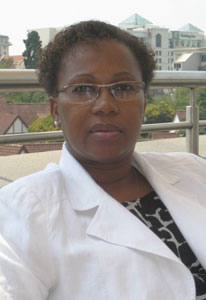Q & A with MEPI grantee Dr. Emilia Noormahomed
March / April 2011 | Volume 10, Issue 2
In recognition of Women's History Month, Global Health Matters sat down with Dr. Emilia Noormahomed, a parasitologist at the Universidade de Eduardo Mondlane in Mozambique, the only female Principal Investigator receiving a Medical Education Partnership Initiative (MEPI) award.
How did you choose this career path?
I was very much influenced by my parents. My father started his career as a nurse and ended as a nursing instructor at Maputo's central teaching hospital. My mother was a pharmacist. My father also had a private practice. As a child, I used to help him prepare everything to do his job, sterilizing the syringes and so on. All my life I wanted this kind of career. I'm the kind of person who likes to always innovate and do new things. I consider myself to be privileged and think it's my duty to work to improve the health of my country and that's what I'm fighting for.

Photo by Ann Puderbaugh
Dr. Emilia Noormahomed, a
parasitologist at the Universidade
de Eduardo Mondlane in Mozambique,
is the only female Principal
Investigator receiving a Medical
Education Partnership Initiative
(MEPI) award.
Has it been difficult to be a woman scientist?
Fortunately, I grew up without any feeling of discrimination as a woman and that was also the case at medical school. In my country, most doctors are women. Now, 51 percent of my students are women, which you don't find in many places in Africa.
When I graduated from medical school, I was in the first group of students invited to join the faculty. I began in the microbiology department and took advanced courses in infectious diseases while teaching. Later, I completed my Ph.D. in parasitology at the University of Grenada in Spain, with a thesis on cysticercosis. I now study malaria, HIV/AIDS and other opportunistic infections.
In 2002, I was appointed dean of the medical school and tasked with improving the curriculum to increase the number of graduates and decrease the failure rate. Since 1963, the school had graduated an average of only 21 doctors a year. Since it's the only medical school in our country, it was important to expand. We now graduate about 100 doctors a year. That work was very exciting for me but I wanted to get back to research so I stepped down after four years.
What has been your greatest frustration?
My biggest frustration is when I see institutions devoting money to send trainees abroad to get their Ph.D. without creating the infrastructure for those people to return home to contribute to their country. What is the point of wasting so much money when they come home and cannot practice what they have learned? We will never develop our country's research capacity that way.
What advice do you have for young African women interested in science?
My advice is they should always be decisive, persistent and find a balance between their professional ambitions and the other duties we women have at home. They should fight for their rights. It's not easy to find a balance but I feel proud of my children, who I had when I was still completing my studies. My son, now 26, is studying business and management, while my daughter, 20, is studying architecture. The work-life balance can depend on having the right partner who is supportive. In the end, the success of our careers as women can depend on the environment we have at home.
What are you most proud of achieving?
I am most proud of securing the MEPI grant - this is the biggest award I have ever won. The most important thing about this is the U.S. government is giving us the opportunity to develop a plan that takes into account the knowledge, resources and priorities we have in our country, with the objective of empowering African people to build up leadership and ownership. Also, this initiative is concerned with facilitating and sustaining networking among our African institutions to develop South-South collaborations. The most important aspect is our partnership with University of California, San Diego, which will provide technical assistance as we proceed. So the conditions are ideal. We have no reason to fail. And we cannot fail!
More Information
To view Adobe PDF files,
download current, free accessible plug-ins from Adobe's website.